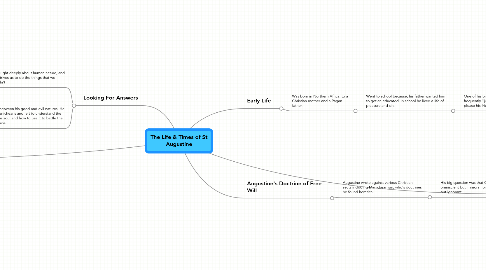
1. Two equal oppositions- Good and Evil. The good is composed of light in our souls, and evil is composed of the dark earth. Making the human part divine part demon. Salvation comes lies in accessing the good soul which is trapped in the evil body.
2. Looking For Answers
2.1. he thought deeply about human nature, and what drives us to do the things that we shouldn't
2.1.1. develops great reputation a a great teacher and thinker and was offered a position as a teacher of rhetoric.
2.1.1.1. He was "set ablaze" by philoophy yet, he had little access to Greek philosophy works so he referred to the bible but, found little answers. So he turned to Manicheanism [combination of astrology and religious doctrine]
2.1.1.1.1. Manicheanism
2.2. He felt a struggle between his good and evil natures. He disbelieved the Manicheans and left to understand the "pure" nature of his soul and how to use it to battle the wickedness of his sins.
2.2.1. He sinned with his mistress, but continued to sin, but he looked for practical answers in both philosophy and Christianity for the means in his fight for battling his sinful nature.
2.2.1.1. His search for answers drives him mad.
3. Augustine uses philosophical reasoning to answer this question by saying, that for God there is no future, only the enternal present. For him everything happens at once.
3.1. God is outside of time because, he exists in all eternity at all times.
3.1.1. Like the Stoic's Augustine believed that freedom is the capacity of doing what one wants.
3.1.1.1. Augustine points out that God's foreknowledge of someone's decision does not cause the decision.
4. Early Life
4.1. Was born in Northern Africa, to a Christian mother and a Pagan father.
4.1.1. Went to school because, his father wanted him to get an educated. In school he lived a life of pleasure and sin.
4.1.1.1. One of his biggest regrets was stealing pears frequently "just for the fun of stealing" and to please his friends.
5. Augustine's Doctrine of Free Will
5.1. Augustine wrote against various Christian sects including Manicheanism, who's doctrines he found heretical.
5.1.1. His big question was that God is either omniscient but immoral, or he is benevolent but ignorant.
